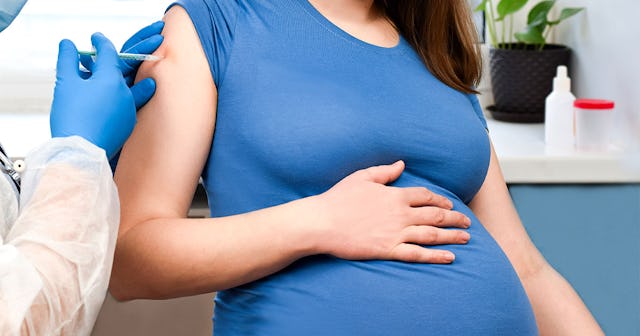Pregnant Folks, Breathe A Sigh Of Relief: The COVID Vaccine Does Not Affect The Placenta

Whenever I’m out and about, I find myself in awe of the pregnant folks I see. They’re living through — and carrying a baby in — a pandemic. During pregnancy, there is enough to worry about, from the array of tests to the uncomfortable vaginal ultrasounds. And now add getting the COVID vaccination to that list. The CDC recommends all pregnant people speak with their doctor prior to getting the vaccine, but they also say that it is not required in order to receive the vaccine.
In late February of this year, Pfizer and BioNtech began clinical trials to test their COVID-19 vaccine on pregnant people. To date, data on how many pregnant people have been partially or fully vaccinated is limited. Dr. Laura Riley, chair of the American College of Obstetricians and Gynecologists’ Immunization, Infectious Disease and Public Health Preparedness Expert Work Group, shared in an interview with NBC News, “By excluding pregnant women, you leave us in exactly the spot we’re in right now — the midst of a pandemic with no information — which is ultimately not helpful to patients.”
Nationally, as of June 4, over 299 million doses have been given, with 50.75% of our country having received at least one dose of the COVID vaccine. 137.46 million people, or 41% of the population, are fully vaccinated. In other countries, pregnant women are having a difficult time getting the vaccine. In India, for example, where hundreds of pregnant women have died from the coronavirus, the vaccine hasn’t been approved for use during pregnancy.
With the recent and presumed link between vaccinated youth and an increase in heart problems, here is reason to be relieved. A new study conducted by Northwestern Medicine and published in the Journal of Obstetrics and Gynecology found that there was no risk to the placentas of pregnant folks who received the COVID vaccine, and their babies’ health was not jeopardized.
The study, which compared the placentas on a microscopic level after delivery of people who had and had had not received the COVID vaccine found that their placentas were not adversely impacted by having received the vaccine. The role of the placenta is to provide a safe home for the baby to grow — sending oxygen and nutrients by way of the parent to the baby. Given its importance during pregnancy, the fact that it appears unaffected by the vaccine is excellent news.
The American College of Obstetrics and Gynecologists, and doctors around the world, recommend the COVID vaccination for all pregnant people — namely because they, and consequently their babies, are at higher risk for complications associated with COVID-19. “Pregnant people are more likely to get severely ill with COVID-19 compared with non-pregnant people,” reports the CDC. Additionally, they say, “pregnant people with COVID-19 are at increased risk of preterm birth and might be at increased risk of other adverse pregnancy outcomes compared with pregnant women without COVID-19.”
Dr. Shad Deering, who is the Maternal-Fetal Medicine Department Chair at the Children’s Hospital of San Antonio and the Associate Dean for Faculty Affairs at Baylor College of Medicine in San Antonio supports the findings of the study. He tells ABC12 News, “Seeing that there were no changes, no inflammation, no damage to the placenta makes us feel even better that we feel this is a safe vaccine.”
As time goes on, and their babies grow, I look forward to reading studies that look at their development too. A study like this should put us all at ease just a little and remind us to love science a bit more. COVID-19 has given us much to fear and worry about. It’s taken loved ones away and changed how we live every single part of our lives from the way (and where) we work to how (and where) we shop. We now have something to celebrate — a vaccination that is proving to help moms and babies alike.
This article was originally published on